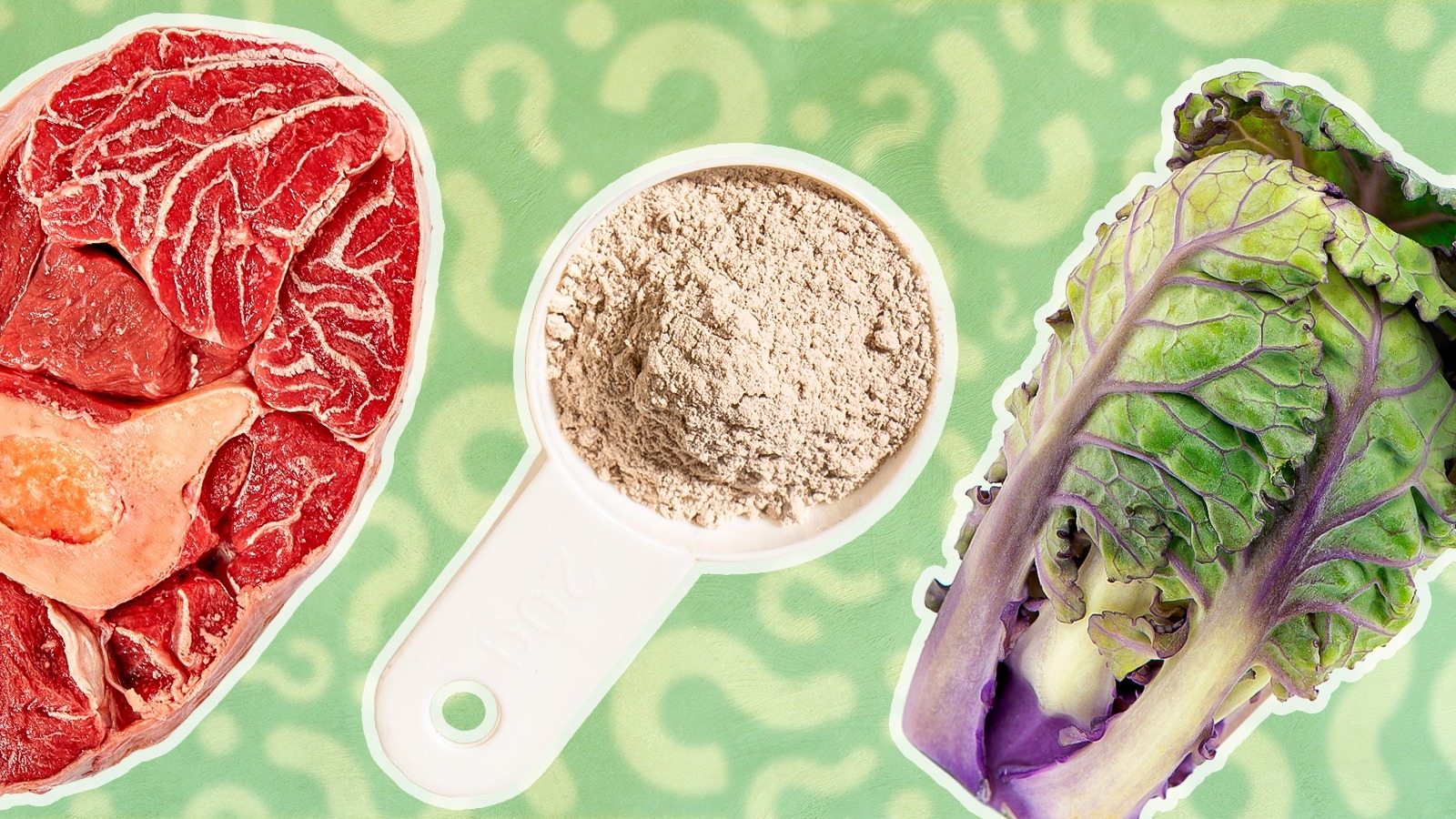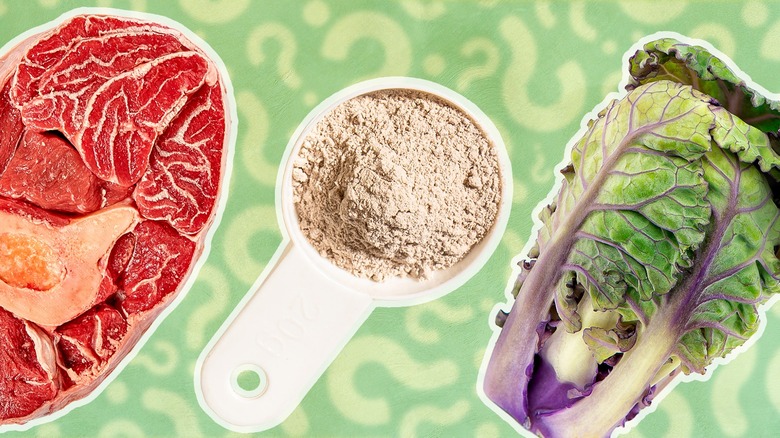
Static Media/Shutterstock/Getty
If you’re baffled by the never-ending conflicting information about dietary protein, you’re not alone. It’s no surprise we’re confused — first, we’re told we only need more protein if we’re exercising (and after exercise, to eat protein at the precise time for it to matter). On the other hand, we’re advised to increase our protein intake if we want to shed pounds and eat high-protein foods throughout the day. Perhaps that’s why the marketplace is crammed with protein supplements in the form of powders, drinks, and bars. Does eating more protein help build muscle and reduce weight?
I’m here to clear up the confusion. Why me? In my 27 years as a nutritionist, I’ve seen the pendulum swing countless times. When I got my master’s in nutrition in 1998, the recommended daily protein intake was 4 to 6 servings. One serving of protein was 2 to 3 ounces, equalling 7 to 9 ounces of protein per day, or about 49 to 63 grams.. In the early 2000s, Dr. Atkins’ low-carb formula for weight loss (and overall health) upped that to 230 to 700 grams of protein per day. That’s a huge leap.
Today, the medical community asserts that we should get 10% to 35% of our overall calories from protein. For a 2,000-calorie diet, that’s 50 to 175 grams. Huge range, right? What’s the best amount for you? There are several factors to consider, and even more myths to debunk. Let’s get into it.
Only active people need to worry about protein

PeopleImages.com – Yuri A/Shutterstock
Protein is required for everyday bodily functions, such as maintaining the body’s pH, digestion, blood clotting, muscle contraction, satiety, thermogenesis, blood sugar control, and chemical messaging between cells, tissues, and organs. This is just a partial list, and these actions happen all the time, even when the body is at rest.
Protein is the major structural and functional component of every cell in the body, and of the 50,000 or so different proteins found in the body, 65% are found in skeletal muscle. That means adequate dietary protein is essential for muscles and bones, as well as overall cellular health. It’s clear we need adequate protein intake for everyday needs, not just after exercise. Currently, the National Academy of Medicine recommends that all healthy adults consume 0.8 grams of protein per kilogram of body weight. For a 165-pound person (75kg), that equates to 60 grams of protein per day. And that’s if you’re sedentary.
Newer research suggests we may need more than the RDA recommends, as much as 15% to 50% more protein than we’ve been led to believe. Not only can inadequate protein intake negatively impact our overall health, but studies indicate that a slightly higher protein intake can help maintain/improve lean muscle mass and muscle strength, and overall body composition, even in older adults. The takeaway: Adequate protein intake is crucial for optimal health, regardless of physical activity.
More protein equals more muscle
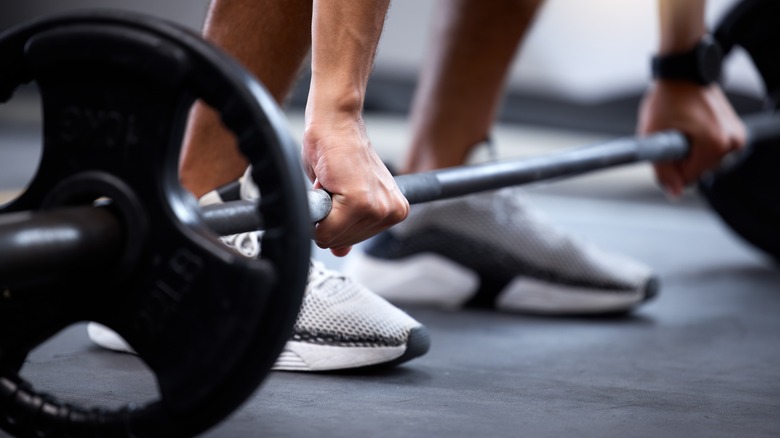
PeopleImages.com – Yuri A/Shutterstock
Strength training builds muscle, not the steak on your plate. Yes, you need protein for muscle repair, recovery, and growth, but protein alone won’t make you buff. As mentioned, protein is critical for many bodily functions, including the maintenance and repair of muscle tissue. If you consume adequate protein, the body has what it needs to perform those functions. Without enough protein, the body turns to muscle for fuel and breaks it down for energy. So yes, adequate protein intake is crucial for preventing muscle loss, but it won’t guarantee a muscular physique unless you exercise too.
The current recommendation of 0.8 grams of protein per kilogram of body weight is the bare minimum a sedentary person needs to prevent muscle breakdown. If you’re active, you need more protein, but it’s not one-size-fits-all because several factors come into play, including age, activity level, gender, and overall health.
The latest research suggests that increasing by as little as 0.1 grams of protein per kilogram of body weight (so, from 0.8 to 0.9) helps maintain and increase muscle mass. But once you get to 1.5 grams (or greater), there’s no benefit. Seems there’s a sweet spot between 0.9 and 1.6 grams of protein per kilogram of body weight, so it makes no sense to overdo it. The body can’t store protein, so excess protein that isn’t used for energy is stored as fat, not in your biceps.
Protein causes weight gain
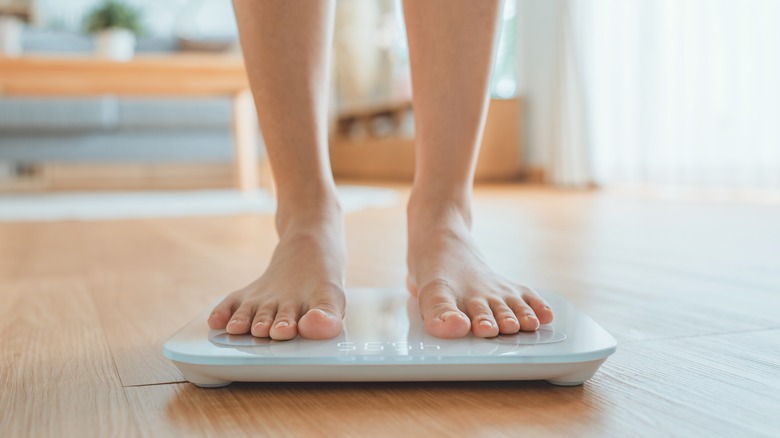
oatawa/Shutterstock
Quite the contrary. Studies show that consuming a diet higher in protein than the recommended amount of 0.8 grams per kilogram of body weight not only promotes weight loss, but it also has a positive effect on the body’s lean muscle mass and overall body composition. A higher protein diet also seems to prevent weight gain after weight loss, meaning you can keep it off.
Note that we’re not talking about huge leaps in protein intake here. If a 165-pound person (75kg) ups their protein intake from 0.8 to 1.0 gram per kilogram of body weight, the number goes from 60 grams to 75 grams, and you can easily get 15 grams of protein from 2 ounces of chicken or 5 ounces of Greek yogurt.
But as with all things, too much is simply too much. If you eat more protein than your body needs, any excess calories that come with it are stored as fat. And many high-protein foods are also high in saturated fat (including fatty cuts of beef, pork, and lamb, and processed meats), which can elevate blood lipid levels and increase your risk of heart disease and colon cancer. High-quality, lean protein choices, such as skinless poultry, low-fat dairy products (including cheese and milk), and lean beef, ensure that you meet your body’s needs without loading up on saturated fat. Choosing a perfect chicken breast over a hot dog makes sense. Avoiding heavily processed powders, shakes, and bars is also a good idea.
Timing of when you eat protein is crucial

Josep Suria/Shutterstock
Do you find yourself racing to devour protein soon after your workout, so you can load your body with nutrients at the perfect time? Turns out, you can chill. There’s no question high-quality, post-training nutrients improve recovery. Here’s why: After we finish a workout, we enter the “anabolic window”, a period of time when glycogen stores are low and muscle fibers are damaged. Loading up on protein within that window prevents further muscle breakdown, starts muscle protein synthesis, and restocks glycogen stores. No one is disputing that. The confusion lies in the length of the anabolic window — what was once thought to be 15 to 60 minutes post-workout may actually be up to 6 hours.
And whether (and what) you ate before your workout matters too. If you have a little protein before exercise, the timing of your post-workout meal isn’t so imperative. If you head into your training in a fasted state (like when you first wake in the morning), your anabolic window shortens, so grabbing a protein-rich meal or snack soon after will help with recovery. If muscle-building is your goal and you’ve hit the weights hard, aim for consuming protein within 2 hours of working out. Again, plenty of time to chill.
Animal protein is superior to plant protein
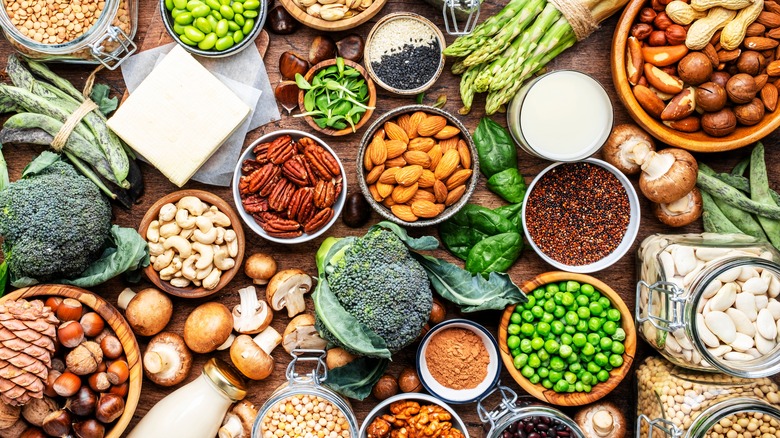
5PH/Shutterstock
The human body needs 20 different amino acids to build proteins. Our bodies can make 11 of those amino acids and they’re called “non-essential” because we don’t need to get them from food. The remaining nine, called “essential amino acids”, must come from food. The best bang-for-your-buck is a “complete” protein because it contains all nine of those amino acids in one food. Animal proteins, including beef, poultry, eggs, and dairy, are complete proteins: they provide all essential amino acids in one fell swoop. Conversely, aside from quinoa and soybeans (and a few other foods), plants are not considered complete proteins because they lack one or more of the 9 essential amino acids.
Does that make animal protein superior? Not necessarily. First, there are a few high-quality, complete plant proteins (such as amaranth, buckwheat, chia seeds, spirulina, and hemp seeds) that not only offer protein but a bounty of other nutrients. Next, it’s easy to combine incomplete plant proteins to create a complete protein while piling on vitamins, minerals, antioxidants, and fiber.
For example, rice is low in lysine and high in methionine, and beans are high in lysine and low in methionine. A marriage made in amino acid heaven. Combine the two and create a complete, nutritious protein. The same is true of pita and hummus and a peanut butter sandwich — what one lacks, the other delivers. And you don’t have to eat the foods at the same time to reap the rewards.
Too much protein harms your kidneys
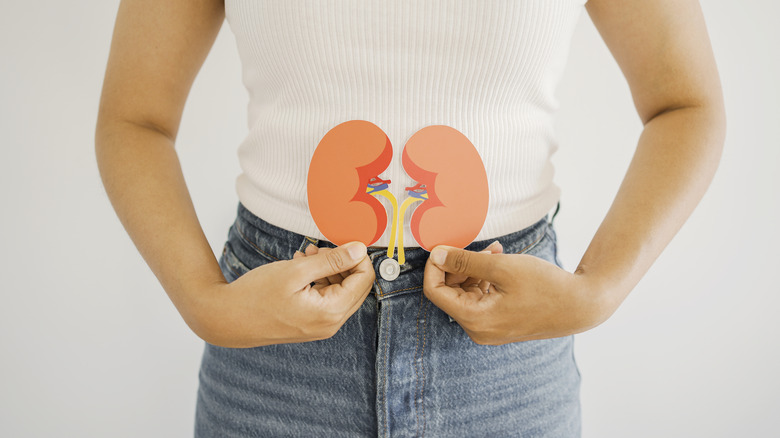
Sewcreamstudio/Getty Images
Unless you suffer from chronic kidney disease, it appears this propagated myth is untrue. I’ll explain: the kidneys serve as part of our body’s filtration system, filtering out waste and excess nutrients from the bloodstream and eliminating them through urine. Excess protein metabolites (byproducts of protein metabolism) are also filtered through the kidneys, so the thinking was that excess protein would stress the organ. Turns out, studies show that the kidneys can handle the load, without any undo strain, even with an increased protein intake. Yes, higher protein metabolites may be an issue for folks with compromised kidneys, but there’s no evidence that a higher protein diet leads to renal disease or impaired kidney function.
There’s more. It seems white meat protein (think chicken), dairy, and plant proteins not only have no adverse effect on the kidneys, but they’re also “renal protective”, meaning a higher protein intake may safeguard the health of your kidneys. If you’re skipping that extra serving of protein because you’re worried about your kidneys, you may be missing out on some serious health benefits.
More protein is bad for your bones

Luis Alvarez/Getty Images
Protein intake plays a critical role in bone health in all stages of life. In children, adequate protein intake ensures proper bone development. In seniors, dietary protein helps maintain bone mineral density while reducing the risk of bone loss, muscle loss, muscle weakness, and frailty — all risk factors for falls.
What about folks in the middle? Dietary protein is equally important, not just for everyday bodily functions, but also for preventing osteoporosis. Truth is, losing muscle mass is a natural part of aging, and it starts as early as your 30s and 40s — and decreased muscle mass is linked to osteoporosis. It’s recommended that daily dietary protein not be less than 61.2 grams for middle-aged and older adults since there’s a clear link between lower protein intake, decreased muscle mass, and osteoporosis.
That doesn’t mean you should overload on protein either. As stated, more protein isn’t always constructive, and there’s a cap to its benefits. While 0.8 grams of protein per kilogram of body weight is the bare minimum to keep the body functioning, exceeding 2.0 grams of protein per kilogram of body weight isn’t helpful and may be detrimental to bone health because it encourages calcium excretion, increasing the risk of osteoporosis. Still, in the vast majority of cases, protein intake will benefit your bones, not harm them.
Protein supplements are necessary to fill in the gaps
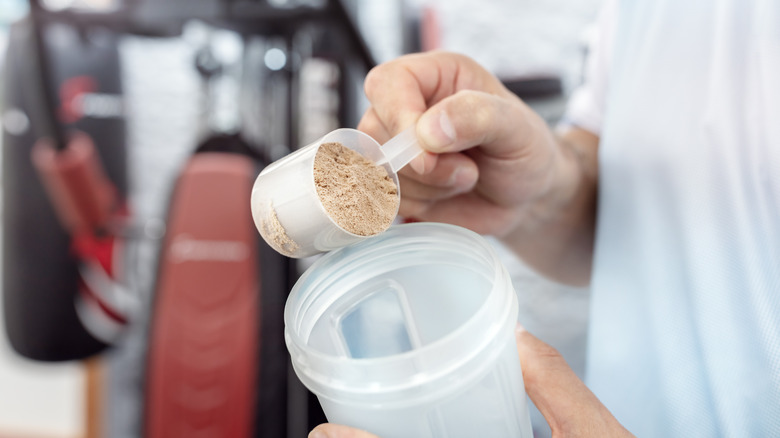
Brianajackson/Getty Images
Despite what the mainstream media has you believe, protein supplementation is not always necessary. If you’re eating healthy, balanced meals throughout the week, there’s a good chance you’re getting the protein you need through your diet. And if you are, adding a protein supplement likely adds little benefit.
If you’re an athlete struggling to meet your increased dietary protein demands, supplementation might make sense. And if you find it easier to grab a protein supplement rather than whipping up a meal, that’s fine too. Just note that while there are plenty of delicious protein powders and other supplements on the market, they’re not all created equal. Some products are purer than others, as many contain unwanted ingredients, including additives, fillers, artificial flavors, and sugar.
They’re called protein “supplements” for a reason, because they’re meant to complement your diet, not replace meals. Choosing protein-rich foods like lean meat, poultry, seafood, nuts, seeds, soy, eggs, and complete plant proteins like quinoa guarantees you’re not only getting high-quality protein, but also additional valuable nutrients as part of the package.

